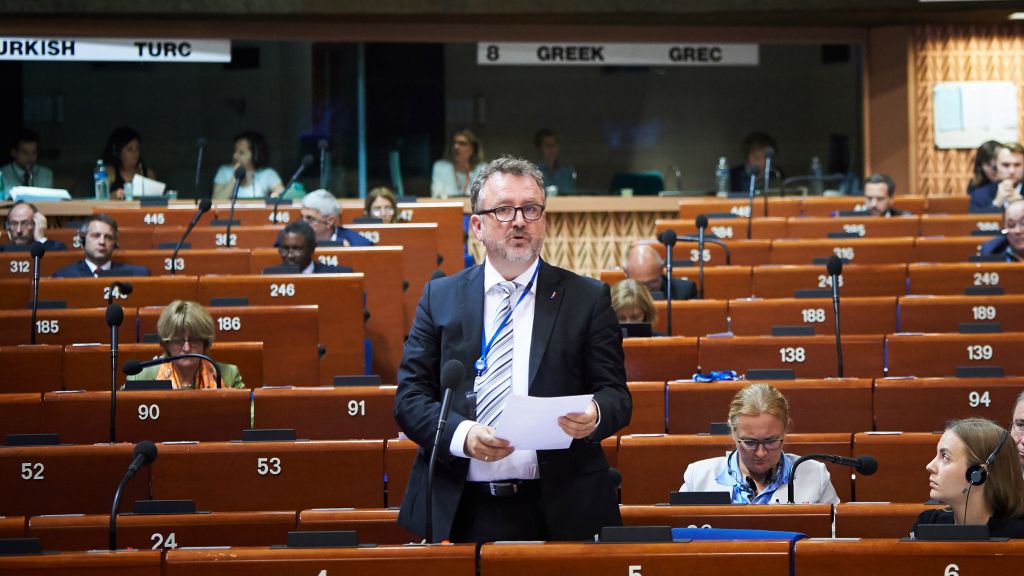Anne Brasseur, Luxembourgish MP and former PACE President continued: “Yet in different countries, Poland one of them, that doesn’t happen. That is no more democracy but a dictatorship of the majority.”
Watch the interview with Anne Brasseur:
This week, the Parliamentary Assembly of the Council of Europe (PACE) adopted a resolution on threats to the rule of law. It focused on the threats in five countries: Poland, Bulgaria, the Republic of Moldova, Romania, and Turkey.
“With this resolution, PACE joins a long line of international organisations expressing concerns and fear with regard to the ongoing constitutional crisis in Poland,” commented Malgorzata Szuleka, Helsinki Foundation for Human Rights.
These international institutions have been expressing concern about threats to the rule of law in Poland for some time. The Council of Europe has done so notably through its Secretary General and the opinions of the Venice Commission. The Council of Europe Commissioner for Human Rights has also been vocal. Elsewhere, at the United Nations, concerns have been raised as part of Poland’s periodic human rights review as well as by the UN Human Rights Committee.
However, this is the first time that PACE issues clear calls to the Polish authorities urging them to reconsider recent steps that would have a negative impact on the rule of law in the country.
“I hope this will be another step to reaching a critical mass of calls, and at some point the ruling majority will realise that if they want to be a member of a club of states respecting human rights, then they should follow such recommendations and calls,” she continued.
Watch HRHF’s interview with Malgorzata Szuleka, in which she continues her analysis of threats to the rule of law in Poland, and gives insight into what this means for human rights:
In Poland, the rule of law has been under threat since 2015, when the ruling party began taking actions to undermine the independence of the constitutional tribunal, and in effect the entire justice system.
This week’s resolution calls on the Polish authorities to “refrain from conducting any reform that would put at risk the rule of law, and in particular the independence of the judiciary.” In this context, it calls on the Polish authorities not to “amend the Act on the National Council of the Judiciary in a way that would… establish political control over the appointment process of judge members.”
It further calls on the Polish authorities to “refrain from implementing any legal provisions that would terminate the term of office of judge members of the National Council of Judiciary in Poland or of the First President of the Supreme Court.”
In July 2017, Polish President Andrzej Duda announced that he would veto controversial amendments that would effectively terminate the independence of the country’s Supreme Courts. He did so, but signed in a law on the lower courts, which is already having an impact on their independence.
These vetoes were welcomed by non-governmental organisations and the international community. However, President Duda himself has now presented two new draft laws affecting the same bodies. Some have suggested the reason for his vetoes may not have been to protect the independence of the judiciary, but rather as part of divisions over who in the political system should have control over the judiciary.
In the resolution, the Assembly does also request for the Venice Commission to give an opinion on this law affecting the lower courts, as well as opinions on the two draft laws presented by the President.
More than this, the Assembly calls on the Polish authorities to fully co-operate with the Venice Commission and implement its recommendations, especially those with respect to the composition and the functioning of the Constitutional Court.
Rule of Law Checklist
In a separate resolution, the Assembly endorsed a “Rule of Law Checklist” to provide a “new, uniform benchmark for measuring compliance with one of the founding principles of the Council of Europe.” This checklist has been drawn up by the Venice Commission.
Developments in Poland
In addition to changes to the functioning of Poland’s Constitutional Court, the Polish ruling party has passed laws giving government control over public TV and radio, granting additional powers of surveillance, and merging the functions of the Justice Minister and the formerly independent Prosecutor General.
More on Poland
- Poland: Acceptance must lead to implementation
- Polish judiciary law threatens rights
- Challenging Poland’s human rights trajectory
- Poland: Two small setbacks on the road to illiberal democracy
- Poland’s “constitutional crisis” raises human rights concerns at UN
- Polish women have gone on strike in protest of anti-abortion law
- Rule of law under threat in Poland





